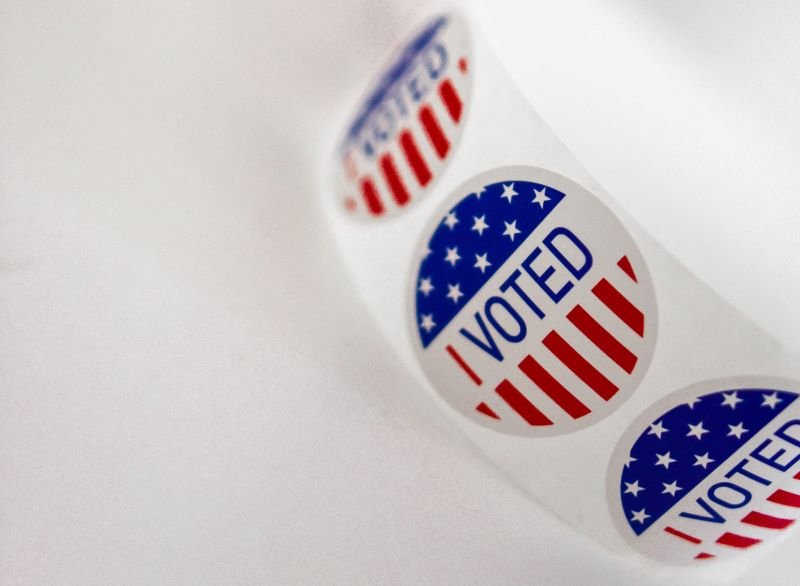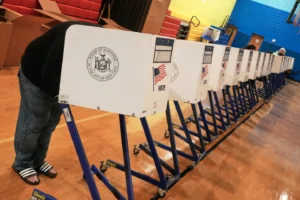Judge Rejects Challenge to Wyoming’s Voter ID Law
Attorney argued that the new requirement infringed on voters’ rights
- Published In: Politics
- Last Updated: May 08, 2023

Wyomingites are now required to show an ID when voting in person, a new rule that was recently upheld by a state judge. (Courtesy photo from Element5 Digital via Unsplash)
By CJ Baker
Special to the Wyoming Truth
In February, while Wyoming legislators were busy debating a series of changes to the state’s election laws, a judge upheld the voter ID requirements they added in 2021.
A Laramie lawyer had challenged the statute last year, arguing that requiring voters to show identification at the polls amounted to “trammeling the right to vote and other collective constitutional protections.”

However, District Court Judge Dawnessa Snyder of Rawlins dismissed Tim Newcomb’s complaint on Feb. 14. The judge said Newcomb had failed to show “who was harmed, when the harm occurred, or even if harm is likely to occur.” For example, Snyder noted that the retired attorney never said whether he was a registered voter affected by the law.
“There are not even any allegations that he has been refused the opportunity to vote by failing to provide one of the acceptable forms of identification,” Snyder wrote. She suggested Newcomb only faced “perhaps a minor inconvenience of having to carry a wallet that usually already contains at least one type of identification as outlined in the disputed statute.”
In her seven-page order dismissing the case, Snyder generally adopted the arguments made by the Wyoming Attorney General’s Office in defense of the law.
Secretary of State Chuck Gray, who sponsored the “landmark” voter ID legislation during his time as a state representative, described himself as “extremely pleased with Judge Snyder’s decision to dismiss the nonsensical lawsuit.”
“… I never doubted for a second that it would survive constitutional scrutiny,” Gray said in a Friday statement to the Wyoming Truth. “As Secretary of State, I look forward to continuing to advocate for election integrity.”
The Wyoming Truth was unable to immediately reach Newcomb’s attorneys.
Bill had widespread support
Wyomingites have long been required to show a driver’s license or other official identification when registering to vote. However, prior to the 2022 elections, voters who were already registered only needed to state their name and address before getting a ballot at their polling place.
Although there were no documented cases of voters impersonating other voters at the polls, the lack of verification made some lawmakers uneasy and prompted the passage of House Bill 75.
The bill requires voters to show a state or tribal driver’s license or ID card, U.S. passport, military card, student ID from a Wyoming public school, college or university or Medicare or Medicaid insurance card when voting in person. To ensure cost wouldn’t be an issue, the legislation also requires the Wyoming Department of Transportation to waive its $10 fee for an ID card if the person is only using it to vote.
HB 75 passed by overwhelming margins — 28-2 in the Senate and 51-8 in the House — but critics argued the new requirements could prevent some residents from voting.

Represented by fellow attorney and former state Rep. Charles Pelkey (D-Laramie), Newcomb filed his challenge in Albany County District Court in April 2022. Newcomb once coauthored a book on the Wyoming Constitution, and he contended the new law ran afoul of the state’s foundational document.
Article I, Section 27 says, “Elections shall be open, free and equal, and no power, civil or military, shall at any time interfere to prevent an untrammeled exercise of the right of suffrage.” Newcomb said any restriction of that right “must advance a compelling interest most narrowly drawn,” and he argued there was no compelling reason to add the new requirement. Making a voter show an ID when registering and “yet another” when voting is unnecessary, he said.
“State government has every photo that satisfies its needs to identify voters, acquired when a voter registered. That same photo could instantly display for poll workers to recognize that voter’s fundamental right to vote,” Newcomb suggested in his complaint, stating that would allow voters to “be welcomed and thanked for voting — rather than challenged.”
However, Snyder questioned whether the proposal was possible. The county clerks who handle voter registrations do not store voters’ photographs, nor do they have direct access to the state and federal databases that hold those images. Further, voters can register with photoless documents, such as their Social Security card and birth certificate.
Newcomb sought to block the state from enforcing the new voter ID law, requesting an injunction nearly four months before the August 2022 primary. Both it and November’s general election went forward without a ruling from the court and 380,430 ballots were cast under the new provisions.
Voters who forgot their ID or other necessary documents on election day were allowed to cast a provisional ballot. If they brought the appropriate identification to their county clerk’s office the day after the election, the ballot was counted.
Data compiled by the Secretary of State’s Office and analyzed by the Wyoming Truth show 94 provisional ballots were cast across the primary and general elections. That was a jump from 63 provisional ballots in 2020 and 58 in 2018.
Whether that increase can be attributed to the new law is unclear. A little more than half of last year’s provisional ballots were rejected because the voter failed to provide proof of their eligibility to vote or didn’t produce acceptable identification, the data show. However, only three of those 51 rejections were specifically listed as being tied to the new voter ID requirement.
Snyder’s decision appears to have closed the book on that law, but a bigger and more controversial change is coming to Wyoming’s elections in 2024: a ban on so-called crossover voting.
The practice typically involves unaffiliated, Democratic and minor party voters becoming Republicans to participate in that party’s primary election. It’s long irked GOP leaders, who believe the crossover voters distort the results, and lawmakers recently decided to prohibit party changes in the months before the primary. Critics like Jenn Lowe of the Equality State Policy Center suggested the restrictions on voter registrations could draw legal challenges.
“… I would expect that a complaint would be filed with the HAVA, Help America Vote Act, at some point,” Lowe told lawmakers in January.
Under the new law, voters will be prohibited from switching their political affiliation from May 16, 2024 through the Aug. 20, 2024 primary.













